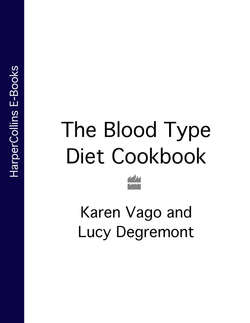Читать книгу The Blood Type Diet Cookbook - Lucy Degremont - Страница 51
type b: health issues Weight and Sugar Metabolism
ОглавлениеIf you have a weight problem it may be enough for you simply to follow your blood type diet, as the lectins in certain foods can disrupt the way your body deals with sugar. These lectins can have an insulin-like effect on the cells. If the cells are continuously stimulated in this way they will transform sugar into fat and store it, instead of burning it as fuel. Too much insulin-like stimulation creates a condition called insulin resistance in which the cells no longer respond to insulin as they should. Dr D’Adamo has found that the lectins in wheat, corn, buckwheat, lentils, sesame seeds and peanuts have a detrimental effect on blood sugar metabolism in blood type B.
Another strategy that is helpful for type Bs is eating enough protein to balance out your carbohydrate intake. This will enable the two hormones that regulate blood sugar levels – insulin and glucagon – to work in harmony.
Some people are very sensitive to the protein/carbohydrate ratio and would benefit from ensuring this ratio is balanced at every meal and snack. For breakfast you may start out by replacing bread and the usual jam with bread and cheese or bread with a scrambled egg. For lunch and dinner always eat one of your good sources of protein with plenty of vegetables and some grains. Here is a visual tip to help balance protein and carbohydrates. Fill one quarter of the surface of your plate with protein (meat, fish, fowl or eggs) and the rest with mainly vegetables and a little rice or other grain. If you eat legumes at a meal, avoid grains as legumes are half protein and half carbohydrate. I find this way of balancing a meal is useful in helping my patients to balance their blood sugar levels and promote insulin efficiency.
Michel
Blood Type B
Age 54
It is not possible for me to state categorically that my good health and controlled weight are essentially due to the blood type diet; to my general care about what I eat and how, to the few nutrients that complement my diet, or to my good nature. Yet despite long work days, nights that are often too short and a fair amount of urban stress, I feel better than ever and now get through the winter without the usual cold.
What I can say with certainty is that (at least to me, a type B) following the blood type diet has neither become constraining, inconvenient nor cumbersome. I just choose the right thing when I have the choice. Every time I have no better choice at hand, or from time to time when I just feel strongly like it, I derogate without guilt. My guidelines are to be cautious about the foods that form the basis of my diet. Thus no one needs to notice and I don’t feel constrained either. I should even add that the blood type diet makes a quite lively and interesting topic for discussion around the dining table.
